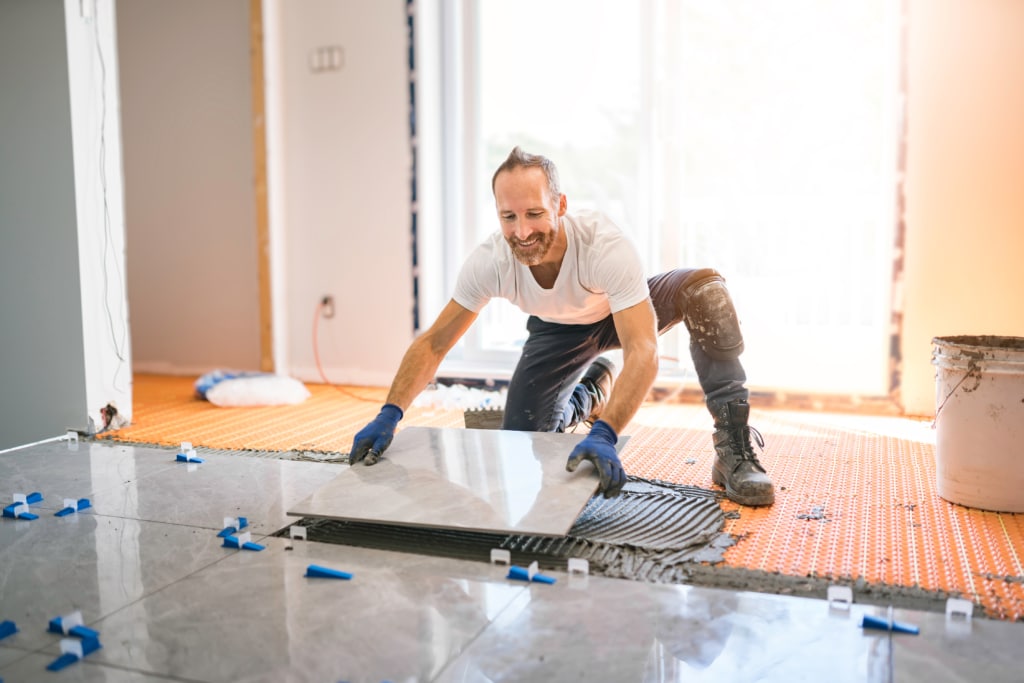

You know what it’s like on the job. One day you’re laying a kitchen splashback, the next you’re carrying tiles up three flights of stairs or waterproofing a bathroom. It’s tough on the body, and there’s always the chance of something going wrong. Think of a cracked floor, water damage, or tools disappearing from the ute.
Insurance is here to support you when the unexpected happens. Instead of worrying about how you’ll pay for repairs, replacements, or delays, you’ve got cover to help carry the load. It’s not only about getting through hard times. It’s about backing your tiling business so it can continue to grow in the years ahead.
At Tradesure, we talk to tilers all the time and understand the challenges you deal with on-site. Our advice is simple and practical, and we’ll help line up insurance coverage that makes sense for the way you work.
Running your own business means you carry all the wins and all the risks. Most days go fine, but it only takes one slip or mistake to throw things off. Maybe a cracked tile leads to property damage, water gets into the wrong spot, or your tools go missing from the ute. Suddenly, you are out of pocket, and the job is on hold.
There is also the risk of serious injury. Tiling is hard on the body, and if you are laid up and cannot work, the bills don’t stop coming in. That’s why having a layer of protection is a must-have. It gives you something to fall back on, so one accident doesn’t undo all the effort you have put into your trade.
And it is not just tilers. Bricklayers, painters, air-con installers — every tradie knows how fast the unexpected can hit. Having cover behind you helps keep the work steady and shows clients you run your business the right way.

Every tiler works a little differently, but one thing is the same for all; the risks that come with the job. Having the right insurance helps you stay on site and keep your business running when things don’t go to plan. Here are the main types of tiler insurance policies worth knowing about:
This is probably the most important one for not just tilers, but every person who works as a tradesman. Tilers often work in finished spaces where clients expect a clean, problem-free result. If a tile cracks a slab, water leaks into the wrong place, or someone slips on the site, the costs can be huge. Public liability insurance helps cover those bills, from compensation to legal fees, so you are not left with the burden.
Your tools aren’t just part of the job; they are the job. Tile cutters, mixers, grinders, wet saws, and the trailer or ute you use to move them all cost years of investment. Without them, even the simplest job becomes impossible to finish. A break-in, fire, or accidental damage can wipe out thousands of dollars’ worth of gear in one hit.
Tools and equipment insurance gives you the support you need when those setbacks happen. Instead of scrambling to borrow or buy replacements out of your own pocket, you can get back on site with minimal downtime. For a sole trader, that kind of cover can mean the difference between meeting deadlines and losing work to another tiler.
Then there’s the risk to yourself and your crew. Tiling is hard on the body, and a serious injury can put you out of work for weeks. Personal accident insurance helps keep income coming in when you can’t be on site. And if you’ve got subcontractors or a small team, employer liability insurance steps in if someone gets hurt while working under your watch.
Fact: The right cover depends on how you run your business. Public liability and tools insurance are common must-haves, but personal accident or employer liability might be just as important if you’re on your own or managing a crew.
Fact: Insurance isn’t about how good you are; it’s about what you can’t control. Storm damage, theft from your ute, or a client making a claim can hit any tradie. Cover gives you a backup plan so your business doesn’t take the full hit when life throws something unexpected your way.
Fact: Liability insurance protects you too. If someone makes a claim against your work, it helps with legal fees, compensation, and repairs. Without it, you’re solely responsible for the costs.
Fact: Bricklayers, painters, and tilers, whether young or old, are prone to injuries. Insurance isn’t about age; it’s about protecting your income when you can’t work.
Fact: Sole traders can take out both types of insurance. Indemnity helps in disputes over advice or workmanship, while employer liability is essential if you’ve got subcontractors or staff.
Don’t let one rough day put your tiling business at risk. The right insurance has your back when things go pear-shaped, so you can keep working without the stress of big costs hanging over you. With Tradesure, you have a team of insurance brokers who understand tilers and ensure you’re covered, no matter what.
Contact us today and protect your tiling business. It’s one of those things you’ll be glad to have when you need it most.

Tradie News and Information
Starting A Landscaping Business? Here Is What You Need To Know
10 November 2025 If you’re wondering how to start a landscaping business in 2025 and beyond, you’ve come to the right place. From mowing and garden maintenance to structural projects like decks and retaining walls, every landscaping business starts with a clear plan. We’re breaking down the essentials and sharing practical tips to help you […]

Tools Insurance
What insurance does a carpenter need?
Carpentry is hands-on, physical work that comes with its fair share of risks. From power tools on site to the projects you leave behind, there's plenty that can go wrong, and when it does, it can cost you more than just a few days off the tools. The right insurance helps carpenters protect their income, cover their gear, and keep jobs moving without unexpected financial stress.

Sole Traders
How much is Tradies insurance, and how is it decided?
In this guide, we’ll explain how an insurance company calculates your premium, what factors can push the price up or down, and how to keep your trades insurance costs manageable as your business grows.

Tools Insurance
What insurance does a tradie need?
Getting hurt on a job site doesn’t just ruin your week; it can cost you big time.